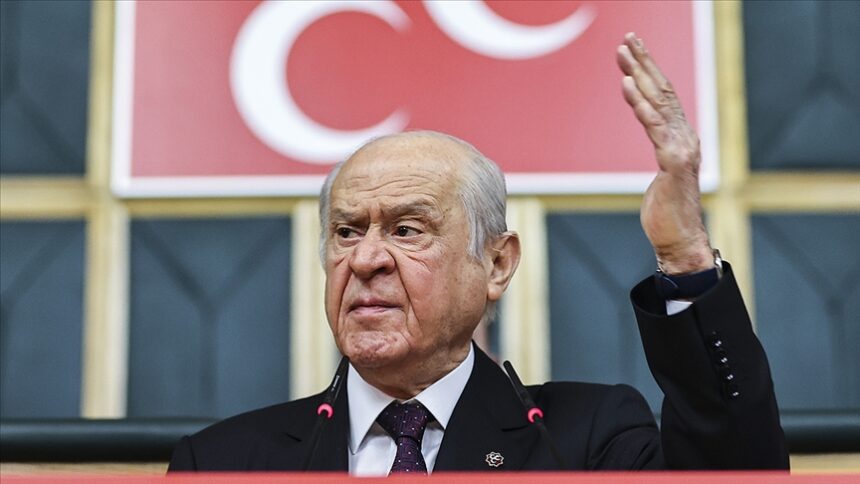On October 8, Devlet Bahçeli, the leader of the Nationalist Movement Party (MHP), spoke to his party members to elucidate recent actions and statements that have garnered attention in a politically charged environment. He dismissed assertions that his present political strategy is a means to expand support in anticipation of the forthcoming presidential elections or to influence the discourse regarding the new constitutional proposal. He regarded such interpretations as “pathetic,” likening them to “seeking shade in a minefield,” a striking metaphor to underscore their futility.
Bahçeli’s pronouncement came after a notably symbolic parliamentary session on October 1, during which his engagements elicited considerable political discourse. It is worth noting that Bahçeli, recognized for his staunch nationalist position, extended a handshake to Tuncer Bakırhan, the Co-Chair of the pro-Kurdish Peoples’ Equality and Democracy Party (DEM), and participated in cordial dialogues with various Members of Parliament. Such gestures are atypical considering the historically complex dynamics between nationalist and pro-Kurdish political factions in Turkey. Bahçeli characterized the handshake as a purposeful communication of “national unity and brotherhood,” claiming it served as a summons for solidarity in Türkiye’s fight against terrorism.
This position holds considerable importance when considering the wider geopolitical transformations that Turkey is currently maneuvering through. Bahçeli emphasized that in a time characterized by shifting global dynamics and redefined borders, the Turkish parliament should embody stability, coherence, and leadership, both within the nation and in the broader regional context. He emphasized that the function of parliament extends beyond merely guiding the nation; it also serves as a stabilizing entity for the entire region, indicating a more expansive aspiration for Turkish influence.
In a notable development during the session, Bahçeli engaged in a brief interaction with the leader of the Republican People’s Party (CHP), Özgür Özel, despite their previous contentious exchanges. This interaction was significant considering the MHP’s usual confrontational position regarding the CHP, underscoring the frequently erratic dynamics of parliamentary relations. The gesture of the handshake and the subsequent exchange of words implied that, notwithstanding the prevailing harsh rhetoric, there exists a potential for dialogue, even amidst the entrenched adversarial positions characteristic of Turkey’s polarized political environment.
Bahçeli’s rhetoric during his address conveyed a dual message: a reaffirmation of his resolute, unyielding political language alongside a recognition of the necessity for bipartisan cooperation. He underscored that, particularly during periods of national and regional instability, Turkey’s legislative body must convey assurance and resilience, both within the nation and in the broader international context. He implored legislators to collaborate with a foundation of mutual respect, positing that such an approach would foster societal cohesion, alleviate political polarization, and enhance peace and security.
This call for cohesion occurs amidst a landscape of internal strife within the principal opposition party, CHP, which has encountered scrutiny for its erratic strategy in managing interactions with President Recep Tayyip Erdoğan and the governing AKP. The session on October 1 highlighted this division, as a notable group of CHP deputies opted to remain seated while Erdoğan entered the general assembly. Sixteen of the party’s 127 lawmakers chose to stay backstage during his address, indicating dissatisfaction and underscoring the ongoing internal discussions regarding the CHP’s approach to the ruling party.
Bahçeli’s recent maneuvers, alongside the CHP’s varied reactions, highlight the intricate and frequently paradoxical dynamics of Turkish parliamentary politics. Gestures such as handshakes, whether symbolic or not, are examined with great scrutiny and may reflect larger transformations in political strategy. Bahçeli’s readiness to interact with Bakırhan—a figure typically linked to pro-Kurdish politics—while sustaining a combative stance towards Özel and other opposition leaders, exemplifies a nuanced and flexible political strategy.
Deliberate Application of Political Discourse and Conduct
Bahçeli’s rhetoric fluctuates between hostility and appeasement, showcasing a calculated employment of language to fulfill various aims. His condemnation of dissenters within the CHP, along with his engagement with DEM members, indicates a more extensive realignment intended to strengthen his nationalist support while discreetly suggesting the potential for a wider parliamentary agreement. This represents a manifestation of political performance, wherein Bahçeli’s rhetoric functions to solidify his stringent persona, while his behaviors imply a more adaptable strategy lurking beneath the exterior.
The intricacy of the situation was further underscored by Bahçeli’s remarks regarding the necessity for cohesion and tranquillity within the parliamentary framework. He contended that this unity would resonate beyond the assembly’s boundaries, fostering a more stable and secure Turkey amidst the current economic and geopolitical challenges the nation confronts. This position is consistent with his overarching message that, during a time characterized by instability and turmoil, Turkey must maintain its strength and unity to effectively address the external challenges it encounters.
Consequences for the Political Landscape in Turkey
Bahçeli’s maneuvering reflects a significant recalibration within Turkish politics as the nation embarks on a new legislative term. His core nationalist stance endures, yet his actions indicate a readiness to pursue political initiatives that were once considered inconceivable. By reaching out to pro-Kurdish lawmakers, Bahçeli may be indicating an awareness that forming parliamentary alliances and fostering cooperation could be essential for addressing the forthcoming legislative challenges, particularly in light of Turkey’s precarious economic circumstances and the volatile international landscape.
For the opposition, these developments underscore the challenges of sustaining a cohesive stance in a landscape where political alliances and hostilities can rapidly evolve. The CHP’s varied reaction to Erdoğan’s presence and Bahçeli’s statements highlights the underlying tensions within the party regarding its strategic approach and tactical decisions. The manner in which the opposition navigates these dynamics will be pivotal in assessing its capacity to challenge the AKP-MHP bloc and establish itself as a viable alternative in the forthcoming electoral cycle.
In conclusion, Bahçeli’s statements and actions illustrate the intricate and nuanced nature of political maneuvering in Turkey, where gestures, rhetoric, and alliances constitute a comprehensive strategy to sustain influence and adeptly navigate a constantly changing political environment. As Turkey navigates the complexities of internal and external pressures, Bahçeli’s delicate maneuvering between confrontation and conciliation is poised to significantly influence the landscape of Turkish parliamentary politics.
By: NAT Editorial Team



